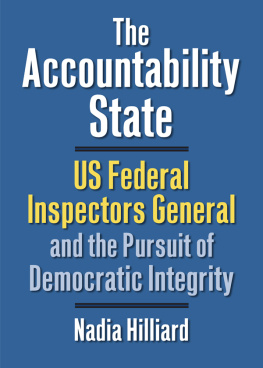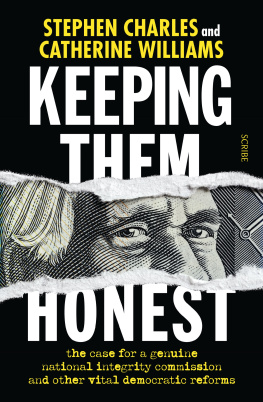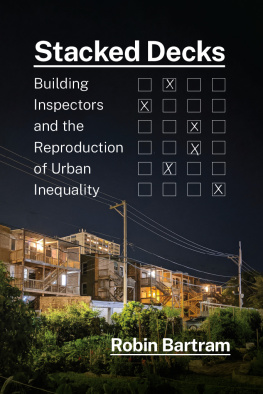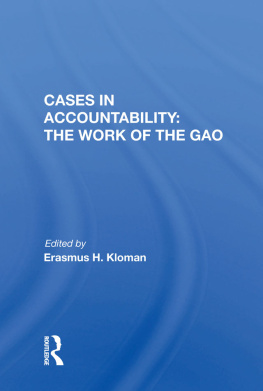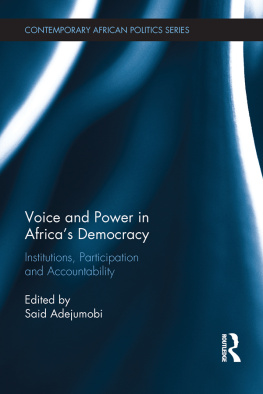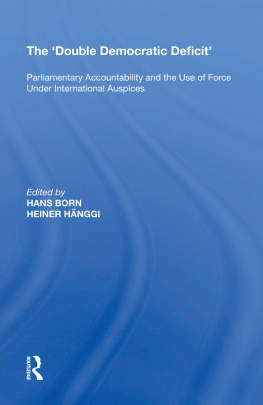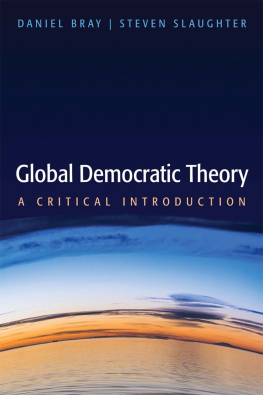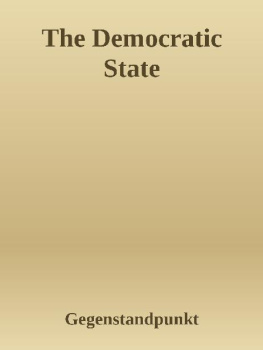The Accountability State
STUDIES IN GOVERNMENT AND PUBLIC POLICY
The Accountability State
US Federal Inspectors General and the Pursuit of Democratic Integrity
NADIA HILLIARD
2017 by the University Press of Kansas
All rights reserved
Published by the University Press of Kansas (Lawrence, Kansas 66045), which was organized by the Kansas Board of Regents and is operated and funded by Emporia State University, Fort Hays State University, Kansas State University, Pittsburg State University, the University of Kansas, and Wichita State University
Library of Congress Cataloging-in-Publication Data
Library of Congress Control Number: 2016051180
ISBN 978-0-7006-2397-6 (cloth)
ISBN 978-0-7006-2398-3 (paperback)
ISBN 978-0-7006-2399-0 (ebook)
British Library Cataloguing-in-Publication Data is available.
Printed in the United States of America
10 9 8 7 6 5 4 3 2 1
The paper used in this publication is recycled and contains 30 percent postconsumer waste. It is acid free and meets the minimum requirements of the American National Standard for Permanence of Paper for Printed Library Materials Z39.481992.
For Aouicha, Raymond, and Jeremy Hilliard, with love and gratitude
CONTENTS
acknowledgments
In writing this book, I found myself in debt to numerous generous individuals, and I now express appreciation for their support: my doctoral supervisor, Desmond King, for making opportunities available, for excellent intellectual guidance and endless patience, and for years of encouragement and friendship; the Rothermere American Institute, a great source of intellectual, social, and academic support, and in particular Nigel Bowles, for his kindness, pastoral care, and steady support; George Frederickson and Mel Dubnick for scholarly motivation; Marc Stears and Gary Gerstle for probing examination and encouragement; Robert Holtom for patient writing advice; Lisa L. Miller for academic advice (delivered with much humor and warmth) and friendship; Gary Schmitt and Harold Relyea for introducing me to the IGs; Glenn Fine for thorough and thoughtful commentary; Steven J. Ackerman for his eager support and resourcefulness; my hardy Mortimer Drive familyDoireann Lalor, Marlene Bovenmars, Imogen Davies, Julian Cottee, and Charlie Fisherfor years of good cooking, good music, daily camaraderie, community, the collective navigation of many a housing disaster narrowly averted, and friendship; Philip Stewart for years of tender friendship, and to Philip and Lucile Stewart for welcoming me to the Writing Up Hermitage; the animals and plants of Boars Hill, Oxford, for providing me with social stimulation in the final months before completing my doctoral studies; Chuck Myers, an astute and supportive editor; Larisa Martin, Karen Hellekson, and Matt Steele for eagle-eyed editing; David Daniel for his probing intellectual criticism, patient daily encouragement, and more than a decade of friendship; Neil Armstrong for the future; and my parents for so much.
list of abbreviations used in text
| ACLU | American Civil Liberties Union |
| ATF | Bureau of Alcohol, Tobacco, Firearms, and Explosives |
| BOP | Bureau of Prisons |
| CA | Consular Affairs |
| CIA | Central Intelligence Agency |
| CIGIE | Council of Inspectors General on Integrity and Efficiency |
| DEA | Drug Enforcement Administration |
| DFE | designated federal entity |
| DHS | Department of Homeland Security |
| DOD | Department of Defense |
| DOJ | Department of Justice |
| ECIE | Executive Council on Integrity and Efficiency |
| ECPA | Electronic Communication Privacy Act |
| EMU | Emergency Management Unit |
| FBI | Federal Bureau of Investigation |
| FEMA | Federal Emergency Management Agency |
| FISA | Foreign Intelligence Surveillance Act |
| FOIA | Freedom of Information Act |
| FSO | Foreign Service Officer |
| GAO | Government Accounting Office |
| IC | independent counsel |
| IG | inspector general |
| INS | Immigration and Naturalization Service |
| IT | information technology |
| MERO | Middle East Regional Office |
| NASA | National Aeronautics and Space Administration |
| NPM | New Public Management |
| NPR | National Performance Review |
| NSA | National Security Agency |
| NSLs | National Security Letters |
| O&R | Office of Oversight and Review |
| OIG | office of the inspector general |
| OLC | Office of Legal Counsel |
| OPR | Office of Professional Responsibility |
| P-A | principalagent |
| PCIE | Presidents Council on Integrity and Efficiency |
| PIERS | Passport Electronic Records System |
| POGO | Project on Government Oversight |
| S/IG | Inspector General of Foreign Service |
| SIGAR | Special Inspector General for Afghanistan |
| SIGIR | Special Inspector General for Iraq Reconstruction |
| SIRU | Special Investigations and Review Unit |
| TSA | Transportation Security Administration |
part i
inspecting the terrain
chapter one
introduction
Quis Custodiet Ipsos Custodies?
The Administrative-Democratic Paradox
In the early 1950s, Dwight Waldo sparked a debate with public administration theorist Herbert Simon over the mutual antagonism between the values of democracy and those of administration. He reserved his strongest criticism for administrative theory: it needed to recognize its own underlying political philosophy and admit that its central principle of efficiency was neither value neutral nor easily reconciled with the principles of democracy.
The debate echoed earlier formulations of the tension by Woodrow Wilson, who promoted the politicsadministration dichotomy as a solution to the (partisan) politicization of administration, and Max Weber, three decades later, who reiterated the need for a sharp distinction between politics and administration to prevent Beamtenherrschaft (rule by bureaucrats). Although Waldo and Simon contended over the distinctions between facts and values, and between policy and administration, at stake lay a variant of the classic trade-off between democratic representation and efficiency. Democraciesespecially a pluralist democracy in the American tradition (i.e., a polyarchy)need to provide citizens and groups the opportunity for direct engagement in the processes of the polity, including elections, deliberation, policy creation, and the maintenance of accountability. But because such processes are time-consuming and inefficient, bureaucracies are delegated policy-making authority without being held to account through regular elections or transparent practices, and this leaves citizens unable to influence the way they are governed.

